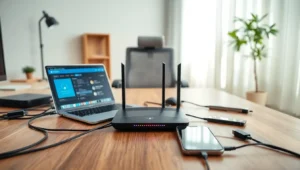In today’s tech-savvy world, staying connected at home is no longer a luxury, it’s a necessity. Remember the days when your Wi-Fi would drop faster than a hot potato? Well, it’s time to say goodbye to those frustrating moments. Finding reliable home networking services nearby could be the difference between binge-watching your favorite shows uninterrupted and staring at a spinning loading icon. So, buckle up as we jump into the realm of home networking and discover how the right services can keep your home connected, efficient, and all-around brilliant.
Table of Contents
ToggleUnderstanding Home Networking

Home networking refers to the practice of connecting multiple devices within a household to share internet access and resources. Think of it as a bustling hub where smartphones, tablets, laptops, and smart home devices can communicate seamlessly.
At its core, a home network typically includes components such as routers, switches, and various cabling setups. These elements create a framework that allows all devices to connect to the internet and to each other.
There are two primary types of connections, wired and wireless. Wired networks use physical cables, providing stability and speed, while wireless networks, often referred to as Wi-Fi, offer the convenience of mobility without the tangles. Regardless of the type, a strong home network is crucial for modern living, enabling everything from online gaming to working from home.
Importance of Home Networking Services
Home networking services are essential for ensuring that every device in a household can access the internet quickly and reliably. The importance of these services can’t be overstated: they serve as the backbone of our digital lifestyles.
Imagine a typical day: streaming a movie on the TV, attending a Zoom meeting, while the kids are gaming online. It’s a delicate dance that requires robust networking. Poor connectivity can turn simple tasks into nightmare scenarios. If devices can’t effectively communicate over the network, frustrations will ensue. Hence, investing in professional home networking services can significantly boost connectivity and reduce headaches.
Also, these services often include ongoing support and troubleshooting, giving homeowners peace of mind. No more flying blind when something goes wrong: help is just a call away.
Types of Home Networking Services Available
When it comes to home networking services, the offerings are diverse and tailored to meet various needs. Here are some common types:
- Network Setup and Configuration: Experts will come to your home, set up, and configure your network devices, ensuring optimal performance right from the start.
- Wi-Fi Optimization: No one enjoys buffering, and Wi-Fi optimization services address this by identifying dead zones and ensuring even coverage throughout the home.
- Device Integration: Home networking isn’t just about internet access. This service includes connecting smart devices like thermostats, lights, and security systems for a fully integrated smart home experience.
- Security Services: Professional services often include features like firewall setups and network monitoring to protect against intrusions, keeping both your data and devices safe.
- Ongoing Support and Maintenance: Just like your car needs occasional check-ups, your network benefits from regular maintenance. Ongoing support ensures any issues are promptly resolved.
How to Choose the Right Home Networking Service
Choosing the right home networking service isn’t just about picking the first name that pops up in a search engine. Here are key considerations to ensure you find a service that meets your needs:
- Assess Your Needs: Start by determining how many devices will be connected and the purpose of your network (streaming, gaming, remote work, etc.).
- Check Customer Reviews: Research online by reading customer reviews and testimonials. This insight can reveal the quality of service and reliability of the provider.
- Technology and Expertise: Ensure the provider is well-versed in current technologies and can provide solutions that incorporate the latest advancements.
- Support and Maintenance: Evaluate whether they offer ongoing support. A reliable network service should not just set up and vanish but remain available for troubleshooting.
- Cost-Effectiveness: Finally, weigh the costs against the services offered. Sometimes, paying a bit more upfront for quality service can save you money and headaches down the line.
Potential Costs and Pricing Models
Costs for home networking services can vary widely based on several factors, including the size of the home, the complexity of the network needed, and the specific services required. On average, homeowners can expect to pay between $150 to $500 for new installations.
For ongoing support or upgrades, some companies might offer subscription models, giving you access to 24/7 support for a monthly fee. Also, there may be additional costs for equipment, particularly higher-end routers or specialized smart home devices.
It’s crucial to get a clear understanding of pricing before making a decision. Always ask for an itemized list of services and potential add-ons.
This transparency ensures that there are no surprises once the work is underway.
Top Providers of Home Networking Services
In the vast sea of home networking services, several providers stand out for their reliability and quality. Here are a few top contenders:
- Comcast Xfinity: Known for providing a range of customizable packages based on individual needs, their services also include excellent customer support.
- AT&T: Offers fiber internet service with high speed and reliability, along with assistance in setting up networks.
- Verizon Fios: Another fiber-optic provider, they pride themselves on connectivity and bundling options for TV and phone services alongside internet access.
- Local IT Service Providers: These smaller, specialized companies often offer tailored services and may provide personal touch alongside competitive prices.
Researching individual reviews and service offerings will help in making the best choice suited to specific requirements.





